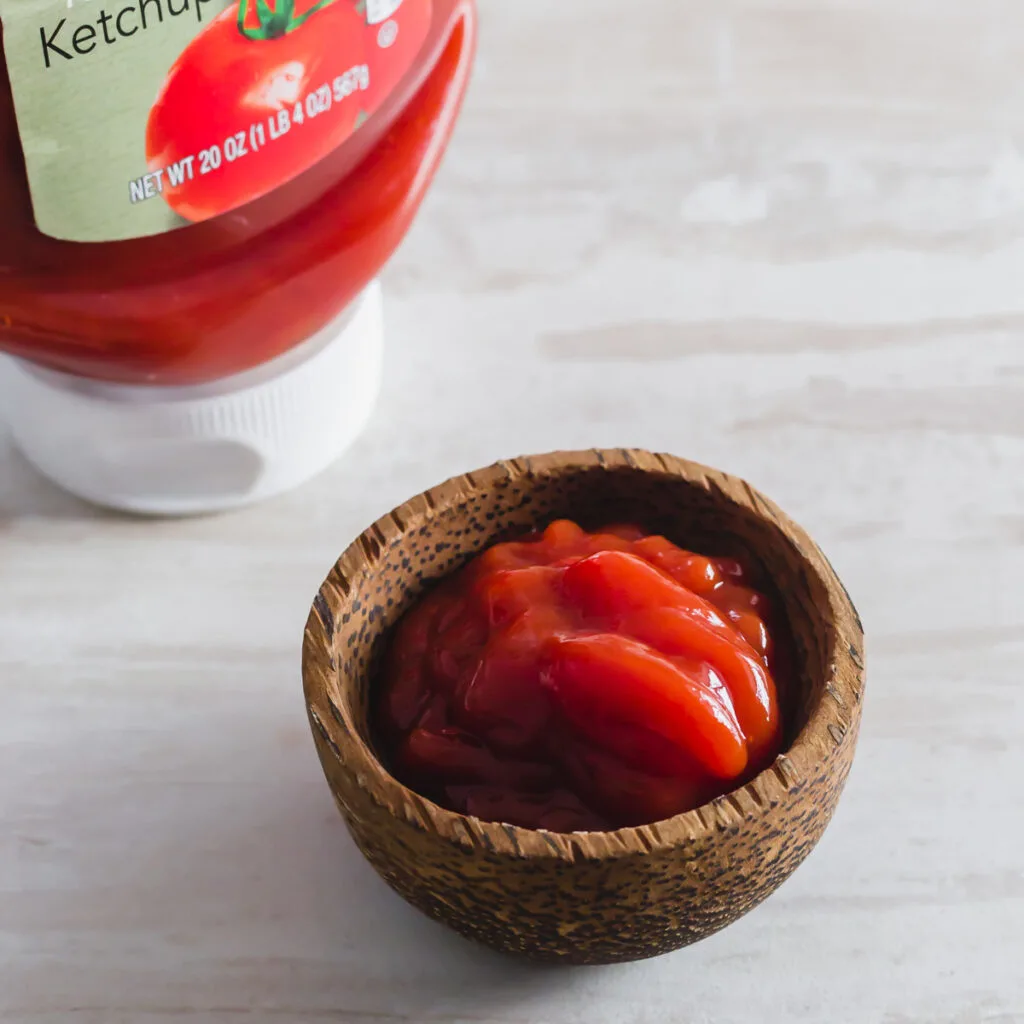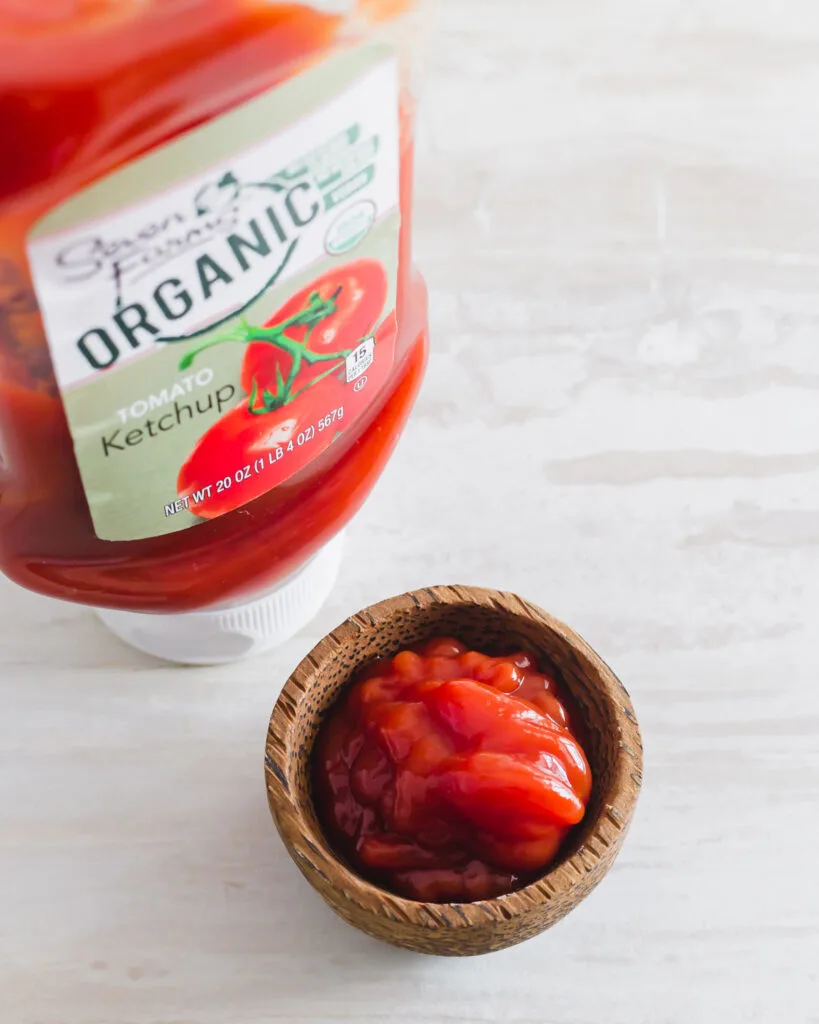Understanding if dogs can eat ketchup is not as cut and dry as you’d think. That’s because ketchup often contains added ingredients besides just tomatoes.
Read on to find out what to be on the lookout for on the ingredients list if you plan on giving your dog ketchup.

IS KETCHUP SAFE FOR DOGS TO EAT?
Ketchup, as we know, is made from tomatoes. Inherently, tomatoes without the leaves or stems are not toxic to dogs.
Green tomatoes, leaves and stems of the tomato plant contain toxins that can pose a threat to dogs so if you have a garden with tomatoes, be aware of this and keep your dog away from the plants as they grow.
While ripe tomatoes shouldn’t be a main component of your dog’s diet, they can occasionally be given as a treat or snack if desired.
Ketchup, however, is not just tomatoes. They may be the main ingredient, but there are always other added ingredients to be aware of.
You’re likely asking “can dogs eat ketchup?” because your dog stole a cheeseburger off the table or ravaged your french fries when you walked away from the table for a moment not because you’re actually feeding your dog copious amounts of this popular condiment.
If you are, let’s set things straight, ketchup is not dog food nor should it be something you’re purposely giving your dog.
That said, if Fido happens to eat a small amount of ketchup by accident, you likely have nothing to worry about.
TROUBLESOME INGREDIENTS IN KETCHUP FOR DOGS
If you turn a bottle of Heinz ketchup hanging out in your fridge around you’ll likely see ingredients such as “high fructose corn syrup” and “natural flavor” listed.
It can be a rude awakening for those not familiar with the actual ingredients in some unsuspecting foods.
Natural ketchup or organic ketchups tend to be a better choice (both for humans and dogs!) as far as eliminating suspect ingredients but be very cautious of any “low-sugar” or “no sugar added” ketchup varieties.
Sugar-free condiments contain artificial sweeteners such as xylitol, a toxic substance to dogs.
Other ingredients often found in ketchups that can be potentially dangerous to canines are spices such as onions, garlic and salt.
It’s common knowledge that both onions and garlic are toxic ingredients to dogs. Both contain certain toxic compounds that can affect a dog’s red blood cells and cause hemolytic anemia.
However, the amount of both onion powder and garlic powder in ketchup is so limited that a dog would have to eat incredibly large amounts before succumbing to any adverse effects.
Added salt is never a good thing for a dog to consume but it’s also not life threatening at the amounts found in a ketchup packet or small amount of ketchup that may be on your burger, hot dogs or side of fries.
Salt poisoning would necessitate a significant amount of ketchup.
Some commercial ketchup will also contain a thickener such as xanthan gum. While this isn’t something that has shown any negative effects on dogs, it’s also something that just doesn’t need to be in their diet either.

WHAT TO DO IF YOUR DOG EATS KETCHUP?
If you find yourself in a situation where your dog ate large quantities of ketchup first check the bottle to see if it contained any xylitol.
In this case, it’s important to get the dog to a vet immediately as even small amounts can cause significant hypoglycemia. This is especially important for any diabetic dogs.
For ketchup without sugar substitutes, monitor the dog for any side effects such as vomiting, excessive lethargy, loss of appetite or weakened appearance. If any of these occur contact your vet.
Chances are, however, by consuming just a little ketchup, they’ll be fine. At worse, your furry friend may experience a bit of stomach upset.
KETCHUP ALTERNATIVES FOR DOGS
If you want to experiment with some variety in your dog’s diet and are considering tomato ketchup, consider making homemade ketchup where you control the ingredients.
Creating “dog ketchup” from homemade tomato sauce or tomato concentrate with some dog friendly herbs like basil can be a great flavor enhancer to your dog’s diet or even baked into a healthy treat.

IN CONCLUSION
Dog owners should know there’s little nutritional value in adding ketchup to a dog’s diet. And, depending on the brand and variety, it may even be detrimental to your dog’s health.
Unfortunately, the way ketchup is made, a lot of sugar and added salt are the main takeaways rather than any of the beneficial compounds from the tomatoes.
A better healthy option for adding flavor to your dog’s food is something like pumpkin puree, sweet potato or unsweetened applesauce rather than ketchup.
